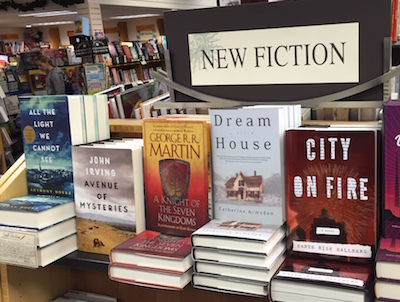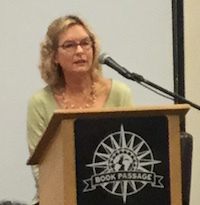A serial about two artists with incurable neurological disease sharing fear, frustration and friendship as they push to complete the most rewarding creative work of their careers.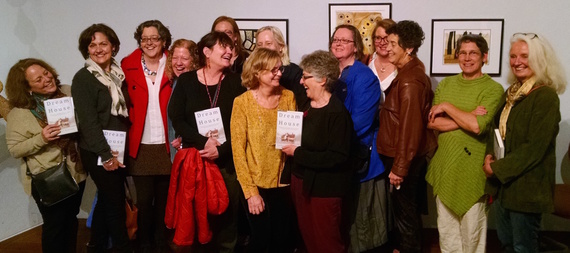
Read Episode Thirty-Four: Finished!. Or, start at the beginning: An Illness's Introduction. Find all episodes here.
After the thrill of seeing Hadley's murals on the walls of the Montana State Capital building, coming home to my novel that was growing roots in a file on my laptop was hard. The disappointment I felt in myself was directly proportional to the admiration I felt for Hadley. It was impossible not to compare our trajectories. Hadley, plagued as she'd been with serious health issues all her life, had turned out many notable projects in her 38 years, culminating in a historic, grand-scale commission. Here I was, on the verge of 60, and I hadn't managed to get Dream House, the project that most mattered to me, out into the world. I'd witnessed Hadley's deep satisfaction, unveiling the strongest and most celebrated work of her life. I wanted that!
The week following my trip to Montana, I attended a rousing orchestral performance. I found myself imagining a violinist playing her instrument in her room for years on end with no clear prospect of ever being heard. An absurd notion, as music is meant to be listened to. We don't think of writing as a performing art. But like musicians, writers work assiduoaulsy to craft an affecting expression of their ideas and stories in order to touch an audience with their words. Writers, I glumly mused as the orchestra played on, can write for years without having their work read.
Away doom and gloom! I couldn't let my discouragement quash my determination. I began making inquiries about self-publishing. I had no well-considered bias against this route to publication; I just didn't feel I had the stamina it takes to make it happen. No sooner had I begun my research, than an email popped up that made my heart gallop. Jay, my Dream House editor, had a colleague who was interested in publishing the book.
It was tempting to get carried away by the excitement of this news. But I didn't share it even with my husband, Lewis, because the only thing worse than riding the rollercoaster of publication hopefulness that had begun four years earlier was taking those closest to me along for the ride. Two weeks after Hadley's mural unveiling, in a state of suspended belief, I drove downtown to meet with Lisa McGuinness, publisher at Yellow Pear Press. We hit it off and right then and there, nailed down details and deadlines to meet for publishing in the fall, November 2015.
Within eight weeks of my meeting with Lisa, my novel had a cover and I was proofreading the galleys. Every week, I let the new reality sink in a little more, but I still felt unable to celebrate. In part, this was because publishing had been a dream for so long that it felt too good to be true. Also, with many hands involved in its production, I fretted about whether the physical book would have the qualities I hoped for. And then there was the obvious: apprehension about how the novel would be received.
Another reason I felt excitement bubbling up only at discreet moments was not related to anxieties about my novel, but rather, what was happening in my day-to-day, i.e., life, which goes on despite the alternate realities our work sometimes constructs for us. Sylvia, after a short remission, was not winning her fight with cancer. The July ablation she'd had on the small lesion on her liver appeared to trigger an inflammatory response, resulting in a new proliferation of cancer cells. By February, she was housebound, except when she needed to see her doctor, and was spending much of her days sleeping. One Saturday evening in mid-March, the water heater on the second floor of her house began leaking through the floor. The plumber who came on Monday used a blowtorch too close to a fire sprinkler in the water heater closet, setting off a monsoon in the house. Sylvia's daughter, Meredith, home at the time, called 911 and me. Then, she led her bathrobed mother down into the street and helped her and their dog into their parked car. When I arrived, there was mayhem: two fire trucks, water everywhere, my stunned, sliver of a friend sitting in the car out front. I drove her to my house and set her up in bed.
Sylvia, her husband Peter, Meredith, and their Golden Retriever stayed with us for a week while their house dried out. It was profoundly affecting to witness the tender, complicated care Peter and Meredith gave Sylvia, and to have one of my dearest friends under my roof at the end of her life. When she was sleeping, I tried to carry on with the daily tasks that were moving my book forward, but my awareness of Sylvia's ephemerality kept me in the present moment. I didn't want to miss something important. I savored the times she asked me to help shift her tiny frame in the bed, each brief conversation we shared. "I don't want to keep going like this," she told me one day. We talked about what's within a patient's power when they are ready to stop suffering and say goodbye. What could be more important, and yet how many times in life do we get the chance to talk this way with someone we love? One morning when we were chatting, she looked deep in thought for a few moments and I braced myself for something difficult. Finally, she said, "I probably won't be able to eat it, but just in case, can you save me some of the Bolognese sauce you made for dinner?" She laughed. She was such a foodie. She'd been eating Gerber baby arrowroot biscuits, mashed potatoes and ground chicken for days; no wonder she craved some zest!
That week, I barely thought about Parkinson's, which felt like a mere annoyance. But I thought a lot about what awaits me and everyone close to me at the end of our lives. During Sylvia's stay, I talked to Hadley and she recalled her last days with her stepfather, Charlie. Our conversation about dying was disorienting, as if I were looking through a camera lens at the four of us -- Hadley, Sylvia, Charlie, and myself -- trying to adjust the focal length to correspond with our (unspoken) perceptions of where we were on the timelines of our lives.
In late March, I sat on Sylvia's bed in the bright California sunshine streaming through the windows. She was waifish, every bone explicit. Always meticulously groomed, she worried aloud about how long her fingernails had grown and I asked her if she'd like me to cut them. Sylvia was a private person, and I felt honored when she said yes. As I held each of her cool, delicate fingers in my hand and clipped, I took my time, relishing the intimacy of this simple task, taking it in as Sylvia's last gift to me. She died several days later with Peter and Meredith by her side.
Winter and spring were a blur of proofreading the Dream House galleys -- every word and punctuation mark, six times (by the time the book went to print, I probably could've told you to pick a word, any word, and I would've been able to turn to the page where it was written)--and pulling together promotional material at the behest of the publicist. Among other things, this included setting up an author Facebook page and a website, which I was lucky enough to have our son, Tobias, design. I learned how to describe the book in as few, hopefully enticing, phrases as possible: "An architect of houses searching for home," "...how we shape and are shaped by our houses," "What makes a house feel like home?" As tedious as the production period was at times, after years of editing Dream House with nothing but hope and encouragement to keep me motivated, I gobbled up the tasks before me, knowing that there would be a monumental payoff. Finally, I was able to put to bed all my sad feelings that are best described by the old question, "If a tree falls in a forest and no one is there to hear it, does it make a sound?"
In July, Lisa met me for lunch to present my printed book. When she passed it across the table, I was unprepared for the emotional rush that sent me diving for my napkin to brush away tears. To me, the book was an exquisite object. The quiet but evocative jacket featuring an image of the Maine house where I was raised perfectly captures the tone and landscape of the novel; the size and weight of the book is modest but inviting. I hadn't dared to hope the physical embodiment of my story and the story itself, in which I explored everything that most moved me: space and architecture, love and motherhood, pain and healing, ocean, sky and trees, would be so well integrated, so...right.
A week before the book's publishing date, in late October 2015, we threw a party. I dubbed it the "If not now, when?" party. I'd been casting about for an excuse to have a very big party for years and a book event seemed more fun than waiting for a milestone birthday, which, especially when you have a progressive, degenerative disease, is not necessarily a cause for celebration. The party was a blast. Local friends and my neurologist came. Friends from the other coast as well as our daughter Elena, my sisters, their husbands and some of their offspring flew in. Tobias's band played and I danced with the freewheeling women in my writing group. Lisa set up a bookselling table and friends generously stood in line to purchase books and have me sign them. While turning my Sharpie loose on book after book, it finally became real to me: my book!
Did I have Parkinson's? Not that night! I spoke into a microphone for the first time in my life. I was nervous, since presenting to groups has never been easy for me, but being in that crowd of well-wishers was like soaking in a warm bath.
From November through April, I talked about Dream House in the west and in New England at bookstores, private parties, newspaper and radio interviews, seven book groups and an architecture school. Awesome family and friends from around the country facilitated opportunities for me to speak and sell books. Mindful of my energy's ebb and flow, I only scheduled events where I knew people who would fill the chairs.
I never stopped feeling nervous when approaching the podium, afraid I'd go blank in the middle of a thought. I did a couple of times, but managed to recover well enough. After describing the inspirations for the novel, I would read a couple of passages and feel my anxiety drop away. Speaking the words I'd written, I re-experienced the passion I'd felt when I started the book years ago. It was powerful to feel I was engaging my listeners' emotions and imagination, not by selling plot or drama but simply through my choice and arrangement of words.
Finally, I was out of my room, playing my music. People were listening.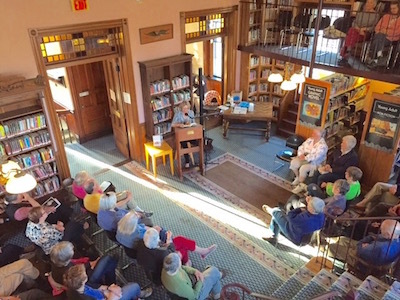
I didn't push much beyond my limitations to publicize Dream House, so the post-publication experience was entirely positive. Even at the event in my hometown, 3000 miles away, where I feared God-knows-who would surface to scold me with a wagging finger for airing my family's troubles, people were warm, inquisitive and even a little proud of their homie author. In addition to old family friends I hadn't seen in decades, two of my first childhood girlfriends were in that room, as well as my first love; their presence added a distracting tenderness to the occasion. Everywhere I went, I filled with gratitude for people's inquisitiveness, enthusiasm, and their persistent pursuit of literature.
That Lewis was the best roadie ever made all the difference. It was as if he'd read a manual on how to support your Parkie wife while she's on a book tour. He hefted my carryon into the overhead bin. Took my hand in the airport when he saw my leg dragging. Schlepped boxes of books and ran peoples' credit cards at private events. While at our Airbnb, he dashed to the market for groceries, made me coffee every morning and, in the evenings before my book talks, a mini margarita to boost my confidence. (Trust me; it works.) Each day, he rode a bike for an hour and a half but insisted he wasn't too tired to go back out and take a three mile walk with me, because he knows that exercise is what keeps my body from shutting down altogether. He was excited to greet the wonderful old friends who came out of the woodwork. Throughout the "season of Dream House," Lewis expressed no complaints. He had lost his partner in architecture years before, but was now proud to crow about her book to anyone who'd listen. He was thrilled for me, but also, like many partners of those with debilitating conditions, he understands the importance of turning up the light on life's joyful passages and significant accomplishments.
So, how did it feel to finally be published at 60? Besides joy, another feeling: relief when I finished my book tour. Taking stock of my Parkinson's progression, I had a sense that publication came not a moment -- or at least year -- too soon. Also a relief was to be done with the story that had been parked in my brain like a giant RV full of claustrophobic family members, and to clear out my cabinet filled with paper drafts, some dating back to the late 20th century. I could move on.
Parkinson's added to my life a new community of friends like Hadley with whom I can share the experience of our disease. The release of Dream House provided another avenue for making meaningful connections. Friends and total strangers have written to me about why they resonated with the novel; the territories that I'd burned to explore ignited in them vivid memories and powerful emotions. I've felt honored and delighted that they've shared, sometimes in intimate detail, tales of their complicated relationships with a house, with a parent, or their children. This -- touching the hearts and minds of my readers and in return, being moved by their stories -- was the least expected but greatest reward of realizing my long-time dream.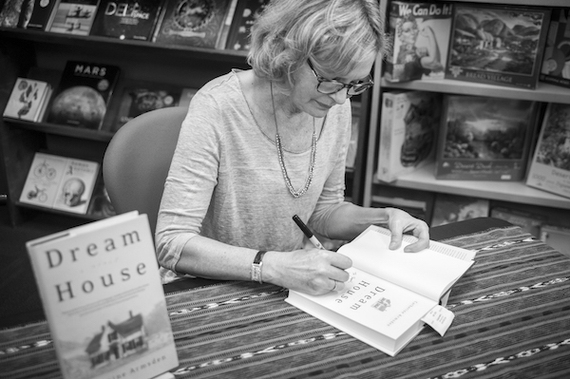
Find all episodes of An Alert, Well-Hydrated Artist in No Acute Distress here.
